The recent news
Sept. 25, 2024
Conferences
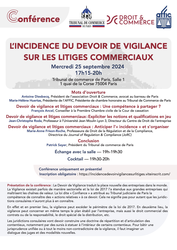
🌐follow Marie-Anne Frison-Roche on LinkedIn
🌐subscribe to the Newsletter MAFR Regulation, Compliance, Law
🌐subscribe to the Video Newsletter MAFR Surplomb
____
► Full Reference: M.-A. Frison-Roche, "Devoir de vigilance et litiges commerciaux : Anticiper l'"incidence" et s’organiser" ("Duty of vigilance and Commercial Litigation: Anticipating the "impact" and getting organised"), in L'incidence du devoir de vigilance sur les litiges commerciaux (The Impact of the Duty of Vigilance on Commercial Litigation), Tribunal de commerce de Paris (Paris Commercial Court), Droit & Commerce and Association Française en Faveur de l'Institution Consulaire (AFFIC), Tribunal de commerce de Paris, September 25, 2024, 17.15pm to 20pm
____
🌐read the report of this speech on LinkedIn (in French)
____
🧮see the full programme of this event (in French)
____
🧱consult the scientific coordination sheet of this event
____
🌐consult on LinkedIn a general presentation of this event (in French)
____
► English Summary of the conference: After listening to the enlightening speeches of François Ancel and Jean-Christophe Roda, I had the great opportunity to emphasise, as they did, that the duty of vigilance, in the respect of French laws of 2017 and 2021, with a view to the transposition of the CS3D, does not imply, so brutally as has been said, a lack of knowledge by judges other than those of the Tribunal judiciaire de Paris (Paris First Instance Civil Court) of this new Law, which is the extension of Compliance Law, as François Ancel reminded us.
Because Commercial Court judges deal with Contract Law on a daily basis, and because companies build their value chains through contracts that should be described as "regulatory contracts", the duty of vigilance has an "impact" on these disputes.
These disputes may be of a "systemic" nature.
This can only result not in jurisdictional trenches, but in "shared jurisdiction", along the lines drawn by François Ancel. This sharing must be built through a dialogue between judges, a necessary method on which Patrick Sayer concluded this elaborate conference on an essential and forward-looking subject.
________
Sept. 23, 2024
Interviews
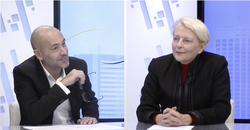
🌐suivre Marie-Anne Frison-Roche sur LinkedIn
🌐s'abonner à la Newsletter MAFR. Regulation, Compliance, Law
🌐s'abonner à la Newsletter Surplomb, par MAFR
____
► Référence complète : M.-A. Frison-Roche, "L'indispensable dialogue entre le droit et la gestion", entretien mené par J.-Ph. Denis à l'occasion d'une série d'entretiens sur le Droit de la Compliance, in Fenêtres ouvertes sur la gestion, émission de J.-Ph. Denis, Xerfi Canal, enregistré le 12 décembre 2023, diffusé le 23 septembre 2024
____
🌐consulter sur LinkedIn la présentation en décembre 2023 de l'entretien
____
🌐consulter sur LinkedIn la vidéo de l'entretien
____
🎥visionner l'interview ci-dessous⤵️
____
🧱consulter la présentation générale de cette série d'entretiens sur le Droit de la Compliance
____
🎥visionner l'interview complète sur Xerfi Canal
____
► Point de départ : depuis 2016, Marie-Anne Frison-Roche construit le Droit de la Compliance, notamment par une collection coéditée en français avec les Editions Dalloz et coéditée en anglais avec les Editions Bruylant :
🧱lire la présentation de la collection en langue française, 📚Régulations & Compliance
🧱read the presentation of the series in English, 📚Compliance & Regulation
____
► Résumé de l'entretien :
Jean-Philippe Denis. Question : Pourquoi Droit et Gestion doivent dialoguer ?
Marie-Anne Frison-Roche. Réponse. : Pour des impératifs pratiques. Aujourd'hui, l'on demande au Droit de sortir de ses frontières en réglant la façon dont les entreprises, à travers les chaînes de valeur qu'elles ont construit, doivent faire en sorte qu'effectivement les droits humains ne soient pas atteints. Pour pouvoir remplir ces nouvelles obligations, les entreprises doivent renouveler leur gouvernance, ce qui relève de la Gestion et non du Droit. Le Droit doit ainsi trouver de nouvelles méthodes, de nouveaux raisonnements, en s'alliant avec la Gestion.
Dans un second temps, comme les juristes n'ont appris que le Droit, il reviendra aux avocats d'aller expliquer ces concepts aux juges, afin que ceux-ci les intègrent dans leur façon de juger. On voit donc ici ce que la Gestion peut apporter au Droit.
___
J.-Ph D. Q. : Loi Pacte, société à mission, RSE, derrière c'est la question de la responsabilité qui se pose et qui unit Droit et Gestion ?
MaFR. R. : Il n'y a pas que la responsabilité qui unit Droit et Gestion. Mais si l'on prend la responsabilité, celle-ci est en train d'être renouvelée dans son concept même.
Historiquement, elle avait été pensée dans son rapport à la morale. On disait qu'il fallait punir ceux qui avaient commis une faute, car il y avait eu une intention de nuire, tout cela étant tourné vers le passé. Cette conception demeure et est par exemple la base du Droit pénal.
Aujourd'hui l'on dit aussi, en plus de cela, que les acteurs en position d'agir doivent avoir conscience de leur position et de leur puissance et qu'il faut d'avantage penser en termes de responsabilisation. Cela implique pour l'entreprise de maîtriser sa puissance et de l'utiliser pour que le monde soit meilleur (responsabilité sociétale), d'utiliser sa liberté, sa volonté, pour exprimer sa fonction dans le monde de demain (entreprise à mission). On dit aussi aux entreprise qu'elles sont des groupes d'être humains, conception moins formelle que celle traditionnellement retenue en Droit, et qu'en conséquence elles doivent se définir en tant que groupe interne et analyser leur rapport à l'extérieur. Ce sont des conceptions de Gestion.
________
Sept. 19, 2024
Editorial responsibilities : Direction of the collection "Cours-Série Droit privé", Editions Dalloz (33)
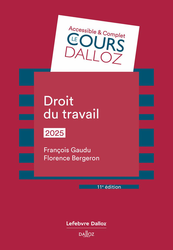
► Référence complète : F. Gaudu & F. Bergeron-Canut, Droit du travail 2025, Dalloz, coll. "Cours Dalloz-Série Droit privé", 11ième éd., 2024, 720 p.
____
► Présentation de l'ouvrage : Ce manuel à jour des derniers textes s'adresse à tous les étudiants en droit et à tous les praticiens qui actualisent leurs connaissances.
Il développe dans une première partie les " relations individuelles de travail " (formation du rapport contractuel, exécution et rupture du contrat de travail), pour consacrer sa seconde partie aux " relations collectives de travail ", (conflits collectifs du travail, représentation et la négociation collective et convention collective de travail).
____
📚Consulter l'ensemble de la collection dans laquelle l'ouvrage est publié
____
📚Sont directement corrélés à cet ouvrage :
🕴️F. Kessler, 📕Droit de la protection sociale
🕴️V. Magnier, 📕Droit des sociétés
________
Sept. 19, 2024
Conferences

🌐follow Marie-Anne Frison-Roche on LinkedIn
🌐subscribe to the Newsletter MAFR Regulation, Compliance, Law
____
► Full Reference: M.-A. Frison-Roche, "Comment s’adapter au Contentieux Émergent de la Compliance" ("How to adapt to Emerging Compliance Litigation"), in , Association nationale des juristes de banque (ANJB), September 19, 2024, Paris,
____
This conference is being held with another speaker, Maître Jean-Pierre Picca.
It is followed by a discussion with the audience.
____
🧮see the full programme of this manifestation
____
► English Summary of this conference: Compliance Law is a new branch of Law, teleological in nature, whose legal normativity is rooted in its goals.These are systemic goals of preserving systems by detecting the risks that weaken them and preventing the failures that can destroy them. It is therefore an Ex Ante branch of Law, the implementation of which will weigh on the "entities" in a position to detect risks and prevent failures so that these systemic goals are achieved. As such, they are "Monumental Goals" in that they are political goals aimed at complete systems. It is therefore essential to distinguish between "conformity Law", which simply consists of "complying" with the applicable regulations, and Compliance Law, which consists of contributing to the achievement of these "Monumental Goals", either by force (legal obligation) or by choice (raison d'être, company with mission, contractual obligation, CSR). In this respect, Compliance Law is both much more limited in its aims and much more ambitious, since it is about building the future rather than mechanically complying with regulations.
The banking sector, which can be considered an exception to the principle of Competition, which is based on extreme mobility and the absence of rents, the destruction of the weakest, risk-taking, the lack of solidity of the operator posing no problem, appears to be the paragon of the principle of Compliance, which is based on the sustainability of systems ensured by the solidity of the operators themselves, their solidarity, the exchange of information, and integrated supervisors. For example, the duty of vigilance and the information about others, and the Regulation through Supervision were born in this sector, which has internalised this sectoral concern in the banks, itself the bearer of a general concern, particularly in the European conception of continental banking. the European Banking Union increasing this concern.
As a result, banks will internalise concerns about the future that go beyond safeguarding the banking sector, such as preventing systemic climate risk or educating the population or safeguarding people in vulnerable situations.
____
The litigation that shall ensue is itself highly specific. The topic of this conference is to provide the keys to understanding how banks must play their part.
Emerging Compliance Litigation is systemic in nature. It is a reflection of the Ex Ante organisation whereby entities are asked to make a contribution to the achievement of Monumental Goals. In a dispute between two opposing parties, an individual or an NGO or a trade union or a municipality or a State and a bank, a conflict arises between what might be called the party claiming to represent the present and future interests of a system, for example the climate system or the social relations system, and the bank which has a legally imposed "compliance obligation" to help protect this system.
The author who described this perfectly was Chaïm Perelman, particularly in his 1978 book, Logique juridique, which describes audience circles.
We need to understand the systemic construction of the judicial instance.
The bank must not let to be confined itself solely to its role as litigant, while the other party, for example an NGO, in its role as guardian of "civil society" or the "climate system" or the "effective equality between human beings", going beyond this first circle between the litigants and brings the system itself into the proceedings.
This is where the adaptation has to take place.
________
This adaptation is procedural, evidentiary and substantive.
The procedural adaptation must take place even before any litigation, since there is a continuum between Ex Ante and Ex Post, with the Judicial System itself being just one accountability method (rendering of accounts) among others. This accountability takes place in relation to a ‘mission’ that is entrusted to the banks in relation to the goals: prevention, detection and the fight against corruption, money laundering, climate change, etc., by building alliances, making good use of information (knowing how to take it, knowing how not to pass it on, knowing how to pass it on).
The procedure, i.e. the way in which something is done, must reflect a substantial element, in that it engenders a ‘sense of responsibility’: the purpose of Compliance Law is to ‘make powers accountable’ and to build on positions of power. The proper procedure is to make ‘good use of one's power’ for the benefit of others. Techniques for ‘taking others into consideration’ are an essential element. Consideration by the person who agrees to exercise power (the power to finance, the power to gather information, the power to organise together, the power to contract).
Evidentiary’ adaptation: indifference of evidentiary obligations and rights to the procedural position of the parties. The firm has a ‘Compliance Obligation’ even if it is the defendant in the proceedings. The object of proof is given to it by the Monumental Goals that the Law or its own will require it to help achieve. Its burden is to show that it is helping to achieve these goals, by acting for the future (for example, by knowing its customers, or by taking into account the interests of its stakeholders, etc.).
______
► Structure of the speech:
I. The current situation: suffering the harmful consequences of reducing Compliance Law to the mechanics of "conformity".
II. The opportunity for banks to adapt by understanding Compliance Law and going beyond the mechanics of conformity: the European puzzle, its apparent complexity, its architectural clarity (CSRD/CS3D/DSA).
III. The opportunity for banks not to allow themselves to be trapped in proceedings that are merely sanctions, transferred from Ex Post to Ex Ante: the emergence of Systemic Compliance Litigations before the Ordinary Law Courts (French Law of 2017 on Vigilance; Paris Court of appeal decisions of 18 June 2024).
IV. What is expected of banks in Systemic Compliance and Vigilance Litigations before the Ordinary Courts, reflecting the dialogue and action required by Compliance Law (article to be published).
V. The opportunity for banks to adapt to the new evidentiary dimension of emerging Compliance and Vigilance Litigation (article to be published).
VI. The opportunity for banks to adapt to the new Ex Ante dimension of Systemic Compliance and Vigilance Litigation, Litigation which deals with the future (article to be published).
____
► A few bibliographical references:
🕴️M.-A. Frison-Roche, 📝Compliance Law, 2016
🕴️M.-A. Frison-Roche, 📝Compliance and conformity: distinguish them in order to articulate them, 2024
🕴️M.-A. Frison-Roche, 📝Duty of Vigilance: the way forward, 2024
🕴️M.-A. Frison-Roche, 📝Systemic Litigation, 2024
________
Sept. 12, 2024
Conferences

🌐follow Marie-Anne Frison-Roche on LinkedIn
🌐subscribe to the Newsletter MAFR Regulation, Compliance, Law
____
► Full Reference: M.-A. Frison-Roche, participation to the round table "Le droit à l'enfant : réalité ou faux concept ?" ("The right to a child: reality or false concept?"), in Regards croisés sur les nouvelles filiations, Cour d'appel de Paris (Paris Court of Appeal), September 12, 2024
____
🧮see the full programme of this event
____
► Summary of the conference:
________
Sept. 9, 2024
Conferences
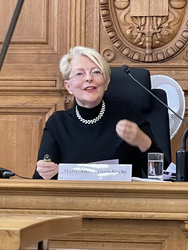
🌐follow Marie-Anne Frison-Roche on LinkedIn
🌐subscribe to the Newsletter MAFR Regulation, Compliance, Law
____
► Full Reference: M.-A. Frison-Roche, "Pourquoi les textes et la pratiques sur le rapport de durabilité vont engendrer un Contentieux Systémique" ("Why the texts and practices on sustainability reporting will give rise to Systemic Litigation"), in Le rapport de durabilité : obligation et Contentieux Systémiques Émergents (The Sustainability Report: Emerging Systemic Obligation and Litigation), in cycle of conference-debates "Contentieux Systémique Émergent" ("Emerging Systemic Litigation"), organised on the initiative of the Cour d'appel de Paris (Paris Cour of Appeal), with the Cour de cassation (French Court of cassation), the Cour d'appel de Versailles (Versailles Court of Appeal), the École nationale de la magistrature - ENM (French National School for the Judiciary) and the École de formation des barreaux du ressort de la Cour d'appel de Paris - EFB (Paris Bar School), under the scientific direction of Marie-Anne Frison-Roche, September 19, 2024, 11h-12h30, Cour d'appel de Paris, Cassin courtroom
____
🧮see the full programme of this event
____
► English summary of the conference: Systemic Litigation refers to a specific category whose proposed category in 2021 refers to "cases" brought before the courts, sometimes specialised, sometimes under ordinary law courts: these are cases in which not only are the parties involved in their dispute but also a system is itself involved, with the procedure and the judge having to allow the interests of the system to be taken into consideration.
However, what is also the subject of new terminology, namely the "Sustainability Report", reflects the same legal revolution: the company must be able to assess not only its economic and financial performance, which is the subject of accounting, but also its development in terms of what it does externally in terms of ESG and what the outside world does about it.
In this perspective, the whole Information System is being transformed, and in different ways depending on the standards adopted, in the United States, Europe or elsewhere, either it is sufficient to obtain Information, no more, so that third parties can adjust their behaviour, mainly investments, or, as in Europe, Law includes a more substantial perspective, so that the company itself adjusts its own behaviour, its Governance, its position in the world, in a renewed relationship with its stakeholders. In Europe, saying and doing are intertwined, CSRD being twinned with CS3D.
Moreover, we can therefore consider that non-financial information, through the sustainability report, its assurance of credibility and the regulation of the audit carried out on it, is itself a system.
The sustainability report, inside the sustainability system, is then interwoven with other systems, which are themselves the subject of Emerging Systemic Litigation: firstly Vigilance, which has been studied as a field of systemic litigation, and then artificial intelligence field, which has been studied in the same way.
The Sustainability Report, insofar as it intersects with the sustainability obligation implied by the duty of Vigilance, may be attracted to the Systemic Litigation to which Vigilance gives rise. In the same way, algorithms can be a tool for data accumulating and matching ESG criteria, which could have the same attraction effect. If this happens, this dimension will have to be present and understood, for example through amici curiae mechanism, in conjunction with the Regulators and the professions concerned.
In addition, as in any emerging mechanism, and as we have seen for example in relation to rating agencies, Tort Law may interfere if the liability of either the company or the person who carried out the audit were to be appreciated, the systemic perspective then having to be integrated into the handling of the case, even before the non-specialised judge.
________

Sept. 9, 2024
Organization of scientific events
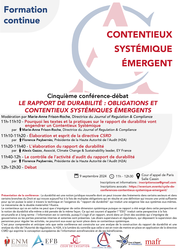
► Full Reference: M.-A. Frison-Roche, Scientific direction of the conference Le rapport de durabilité : obligation et Contentieux Systémiques Émergents (The Sustainability Report: Emerging Systemic Obligations and Litigation), in cycle of conference-debates "Contentieux Systémique Émergent" ("Emerging Systemic Litigation"), organised on the initiative of the Cour d'appel de Paris (Paris Cour of Appeal), with the Cour de cassation (French Court of cassation), the Cour d'appel de Versailles (Versailles Court of Appeal), the École nationale de la magistrature - ENM (French National School for the Judiciary) and the École de formation des barreaux du ressort de la Cour d'appel de Paris - EFB (Paris Bar School) and MAFR, September 19, 2024, 11h-12h30, Cour d'appel de Paris, Cassin courtroom
____
► Presentation of the conférence: Sustainability is a new legal concept, the lineaments of which can be found in certain sectors and branches of Law, and which today has both multiple resulting obligations and a definition that is sufficiently unified to allow it to be grasped through the technique and the requirement of the "Sustainability Report", which translates a requirement linked to the systems themselves. The dual materiality mechanism illustrates this.
The Litigation that will ensue shall be imbued with this systemic dimension, since this report was required from this perspective, and the notion of Sustainability itself was conceived in the same way. What is commonly referred to as "ESG" reflects this perspective, which is both structural and long-term: Information is central here, since it is a Report, anchored in the new conception of Corporate Law that is imbued with Governance, where internal and external stakeholders are present. The various Supervisors and Regulators, who go beyond supervising professionals to regulate activities, are also bound to have a role to play in this Emerging Systemic Litigation.
In order to understand and anticipate this, this conference is built around an analysis of the construction of the Sustainability Report and an analysis of the role of the Regulatory and Supervisory Authority, the French Audit Authority, the Haute Autorité de l'Audit - H2A. These analyses are carried out with a view to the Systemic Litigation that will arise from these new requirements and practices, in correlation with Litigation linked to other fields of Systemic Litigation such as Vigilance field.
____
🧮Programme of this event:
Fith conference-debate
LE RAPPORT DE DURABILITÉ : OBLIGATIONS ET CONTENTIEUX SYSTÉMIQUES ÉMERGENTS
(THE SUSTAINABILITY REPORT: EMERGING SYSTEMIC OBLIGATIONS AND LITIGATION)
Paris Court of Appeal, Cassin courtroom
🕰️11am.-11.10am. 🎤Pourquoi les textes et la pratiques sur le rapport de durabilité vont engendrer un Contentieux Systémique (Why the texts and practices on sustainability reporting will give rise to Systemic Litigation), by 🕴️Marie-Anne Frison-Roche, Professor of Regulatory Law and Compliance Law, Director of the Journal of Regulation & Compliance (JoRC)
➡️read the presentation of this speech
🕰️11.10am.-11.20am. 🎤Élaboration et esprit de la directive CSRD (Elaboration and spirit of the CSRD), by 🕴️Florence Peybernès, President of the Haute Autorité de l'Audit - H2A (French High Audit Authority)
🕰️11.20am.-11.40am. 🎤Comment construire un rapport de durabilité ? (How to build a sustainability report?), by 🕴️Alexis Gazzo, Partner, Climate Change & Sustainability leader, EY France
🕰️11.40am.-12pm. 🎤Le contrôle de l'activité d'audit du rapport de durabilité (The control of the audit of the sustainability report), by 🕴️Florence Peybernès, President of the Haute Autorité de l'Audit - H2A (French High Audit Authority)
🕰️12pm.-12.30pm. Debate
____
🔴Registrations and information requests can be sent to: inscriptionscse@gmail.com
🔴For the attorneys, registrations have to be sent to the following address: https://evenium.events/cycle-de-conferences-contentieux-systemique-emergent/
⚠️The conference-debates are held in person only, in the Cour d’appel de Paris (Paris Court of Appeal).
________
Sept. 8, 2024
Law by Illustrations

► Référence complète : M.-A. Frison-Roche., "Un martyr au service du Droit et de la Justice, caché sous un titre d'un quelconque thriller : 𝑴𝒆𝒏𝒂𝒄𝒆 𝒂𝒖 𝒔𝒐𝒎𝒎𝒆𝒕", billet septembre 2024.
► voir le film-annonce
___
En 2023, sort un film suédois.
Il est présenté comme un "thriller au suspense insoutenable", ce que son titre français soutient : 𝑴𝒆𝒏𝒂𝒄𝒆 𝒂𝒖 𝒔𝒐𝒎𝒎𝒆𝒕.
Ce n'est pas un thriller. Il n'y a pas une menace au sommet. Et cela n'est pa insoutenable.
C'est l'histoire d'un homme seul.
Pourtant quand il revient 3 jours à sa vie, en Suède, avec ses amis, il est comme vous et moi : il déjeune dans un jardin, respire l'air frais, voudrait bien acheter une jolie petite maison, demande des nouvelles de la famille.
Mais quand il remplit son office, il est seul.
Il a tout pour être absolument seul.
Nous sommes au début des années 60.
Il vit à New-York et travaille toute la journée. Lorsqu'on est le Secrétaire Général de l'ONU l'on a peu de temps pour aller dans des dîners, pour se promener avec un chien dans Central Park. Un chien, des enfants, une femme, il n'en a pas. Il a un petit singe, qu'il a ramené de Somalie, sans doute un des nombreux pays où il a été pour aider, aider, aider. Peut-être avec succès ou pas. Peut-être de la bonne façon ou pas. Cela n'est pas dit, ce que l'on voit, c'est son petit singe qui est sur son épaule, qui s'asseoit sur sa feuille où il peut enfin s'exprimer dans sa langue natale, qui court sur son table où il dine seul, toujours seul.
Il est toujours habillé pareil.
Chaque matin, il met une chemise blanche identique à celle de la veille. Chaque matin, il lace ses chaussures.
Car chaque matin, il va à son bureau pour que lui tombe dessus les catastrophes, les urgences, les drames, les situations insolubles.
A chaque fois, il essaie de trouver la moins pire des solutions, de trouver les moins pires des interlocuteurs. Et il rentre chez lui.
Pourquoi faire cela ?
Il écrit en suédois, avec son petit singe sur son épaule que dans sa solitude, qui n'est pas un drame, qui est son état, il faut trouver ce pourquoi il faut se sacrifier.
Il a déjà consacré toutes les années précédentes à accompagner la décolonisation ; il croit au droit des peuples à disposer d'eux-mêmes. Il fait tout ce qu'il peut pour que la décolonisation se passe le moins mal possible en Afrique à l'égard des pays européens et maintenant que les pays ne soient pas tenus par les Etats-Unis et l'Union Soviétique.
il ne fait que travailler.
Hegel appellerait cela un fonctionnaire, mais l'on nous dit que ce film n'est pas un cours de philosophie politique, puisque c'est un "thriller au suspense insoutenable".
Un jour, un coup d'Etat arrive dans un de ces pays d'Afrique.
Le Premier Ministre de ce pays vient le voir pour le dire, que le pays va être dépecé car une province aux ressources minières convoitée qui doit être détachée pour être mieux tenue par ceux d'avant, que lui-même est en danger, qu'il faut qu'il fasse quelque chose.
Il répond qu'il lui faut un peu de temps.
Le Premier Ministre revient dans son pays. Il est immédiatement assassiné.
Des massacres débutent.
Une guerre civile menace.
La province dans laquelle sont ces ressources minières considérables notamment pour la fabrication de la bombe atomique, déclare sa secession. Des industriels étrangers se réunissent. Des réunions se tiennent dans le pays avec le nouveau président avec des représentants des divers intérêts.
Le Secrétaire Général dit : nous allons envoyer des casques bleus et ensuite nous réunirons le Conseil de Sécurité.
En cela, il se condamne.
Il est critiqué de tous les côtés.
Le Conseil de sécurité se réunit.
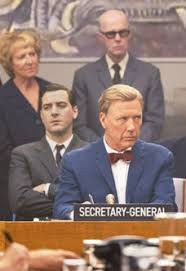
Lors de la réunion de celui-ci, l'URSS demande sa démission immédiate car en envoyant les casques bleus dans ce qui est en réalité une opération militaire il a excédé ses pouvoirs et il a pris parti.
Il répond qu'il a été mandaté pour que l'ONU accompagne la décolonisation et que les pays concernés soient en paix, que la paix est la mission de l'ONU, que la paix implique que les pays décolonisés ne soient pas soumis à la puissance de l'un ou l'autre des deux blocs qui sont à la manœuvre en alliance avec les industries impliquées.
En disant cela, il se condamne une deuxième fois.
Il revient dans son bureau où il apprend que son compagnon le petit singe s'est libéré de sa petite cage capitonnée de velours rouge où il demeure quand il attend son retour , a grimpé dans l'escalier, s'est étranglé par la fine laisse qui lui entourait le cou et qu'il est mort. Leur sort est parallèle, ce n'est qu'une anticipation. Il répond qu'il veut qu'on ôte son cadavre pour qu'il n'ait pas à voir son cadavre en rentrant (il n'est pas masochiste, juste dévoué à ce qu'il pense être juste).
Dans le pays les massacres continuent. Il décide d'aller lui-même rencontrer le président qui avait dans un premier temps accepté sa proposition de réunifier le pays puis a tout rejeté en bloc.
Il se condamne donc une troisième fois.
Il n'y a aucun suspense dans ce film.
Dans l'avion, son lacet de chaussure se casse. Il n'en a pris de rechange. Mais son collaborateur lui passe le sien.
Malgré toutes les précautions prises pour que son avion ne soit pas repéré, l'avion a un accident en plein vol. Il n'y a pas de survivant.
La Suède se met en silence pour lui rendre hommage : le film s'achève sur les images d'archives d'un peuple recueilli.
Plus tard à titre posthume il recevra le prix Nobel de la Paix.
____
Voilà la vie d'un homme droit ;
Appliquer le Droit, comme on peut, le moins mal possible donc.
Se faire menacer, injurier, sanctionner.
Etre inconnu du grand public
Exercer son pouvoir en se basant sur ce pour quoi il a été donné
Essayer de ne donner prise à personne, ni dans son habillement, ni dans son comportement (il aimerait se rapprocher de son ami qu'il aime depuis toujours, mais il ne le veut pas pour ne pas donner prise).
Travailler jusqu'à l'épuisement (il dort sur le canapé de son bureau, prend une douche pour partir au Conseil de sécurité)
Dire la vérité.
N'avoir de reconnaissance et de prix qu'une fois mort.
C'est un documentaire sur Dag Hammarskjöld, ce qu'est l'intégrité et l'amour du Droit (ici le Droit international public) en ce qu'il sert la Justice.
J'aurais volontiers appelé ce film : Le martyr , mais je ne sais pas faire de "thriller au suspense insoutenable".
Le titre suédois du film est simplement le nom de cette personne : 𝑯𝒂𝒎𝒎𝒂𝒓𝒔𝒌𝒋ö𝒍𝒅,
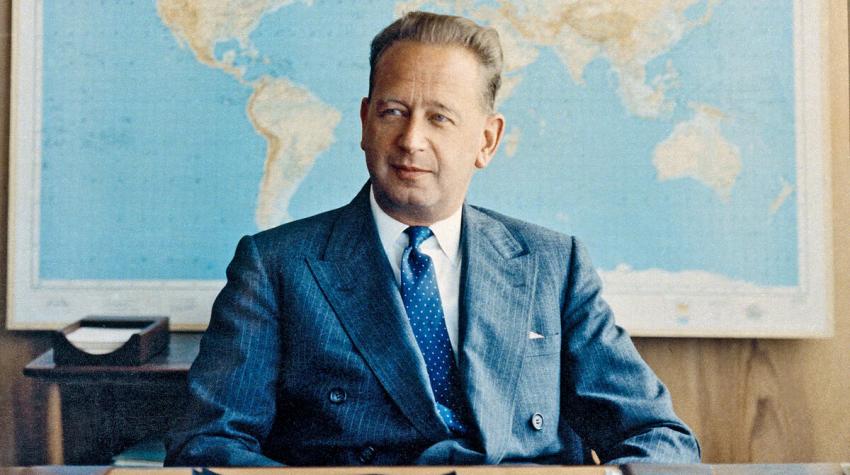

Dag Hammarskjöld,
____